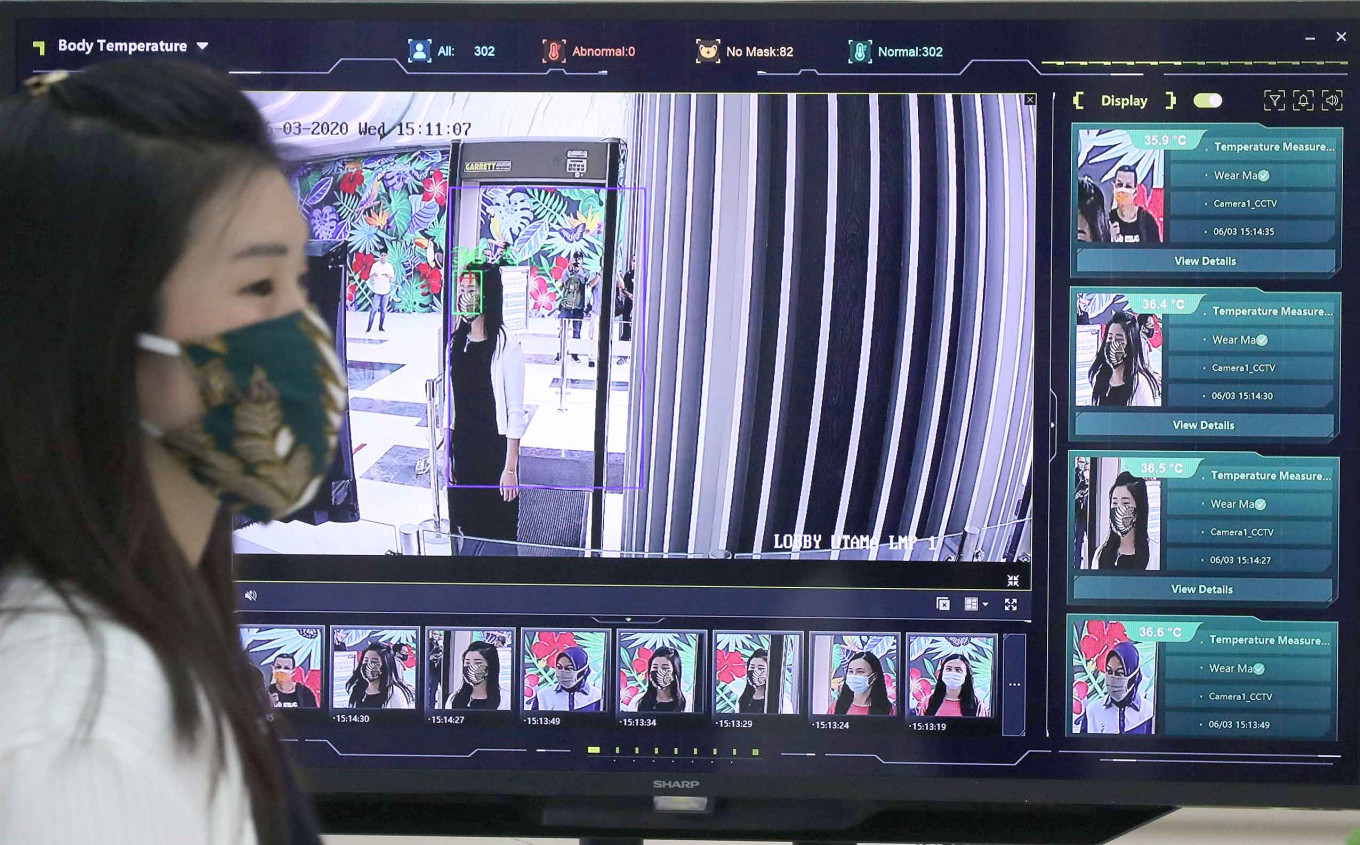Popular Reads
Top Results
Can't find what you're looking for?
View all search resultsPopular Reads
Top Results
Can't find what you're looking for?
View all search resultsIndikator poll shows dip in trust, high health focus for govt's COVID-19 response
Even as the government began its transition from the PSBB to the "new normal" this week, a mid-May survey showed that respondents want it to prioritize public health and not recovering the "bad" economic condition.
Change text size
Gift Premium Articles
to Anyone
 A shopper walks past a monitor showing the body temperatures of visitors at a shopping mall in West Jakarta on Wednesday. A survey by Indikator Politik Indonesia in May shows that 81 percent of respondents view the current economic condition as “bad”, but 60.7 percent of respondents want the government to prioritize public health instead of the economy in its coronavirus response. (JP/Dhoni Setiawan)
A shopper walks past a monitor showing the body temperatures of visitors at a shopping mall in West Jakarta on Wednesday. A survey by Indikator Politik Indonesia in May shows that 81 percent of respondents view the current economic condition as “bad”, but 60.7 percent of respondents want the government to prioritize public health instead of the economy in its coronavirus response. (JP/Dhoni Setiawan)
A
recent survey by Jakarta-based public opinion pollster Politik Indonesia shows that the economic impacts of the COVID-19 epidemic have caused a declining trend in public trust.
Indikator executive director Burhanuddin Muhtadi said that the "significant" waning of public trust in government could be a result of the economic impacts of the health crisis, which had prompted regional administrations to enforce months of quarantine, social distancing and restrictions on economic activities.
"When I conducted the regression analysis, I found that the worsening economic condition greatly impacted the public trust in democratic institutions," Burhanuddin told The Jakarta Post on Wednesday.
Regression analysis basically examines the cause-and-effect relationship between a dependent variable and a set of independent variable; it is called "regression" because the method uses historical data.
The survey, conducted between May 16 and 18, involved 1,200 respondents across Indonesia regarding their level of trust in President Joko “Jokowi” Widodo, the House of Representatives (DPR), the Regional Representatives Council (DPD), the People's Consultative Assembly (MPR), the Indonesian Military (TNI), the National Police and the Corruption Eradication Commission (KPK).
Compared to Indikator's previous survey in February, the latest survey shows a dip in public trust. However, the survey's respondents generally trusted the government, with at least 60 percent checking “strongly trust” or “somewhat trust” in their responses.
Read also: Indonesia records spike in COVID-19 cases as govt eases restrictions
The President's approval rating remained relatively high at 82.8 percent, dropping by 9.4 percentage points from 92.2 percent in the February survey.
The May survey also showed growing dissatisfaction in the government's COVID-19 response and democracy in general, but not Jokowi.
The May survey showed that trust in the DPR declined 14.5 percentage points from 74.6 percent in February to 60.1 percent. Trust in the DPD fared a little better, declining 11.1 percentage points from 74.6 percent to 63.5 percent in May, while trust in the MPR dipped 7 percentage points from 79.1 percent to 72.1 percent.
Among law and security institutions, the KPK recorded the lowest level of trust, declining 6.6 percentage points from 81.3 percent to 74.7 percent, followed by the National Police recording a decline of 6.2 percentage points from 85.6 percent to 79.4 percent.
The TNI recorded the highest level of trust but saw the largest decline, dipping 9.9 percentage points from 95.4 percent to 85.5 percent.
Meanwhile, 74.1 percent of respondents indicated trust in the judiciary, which was not covered in the February survey.
Regarding the economic variable, 81 percent of respondents perceived the economic condition in May as “bad”, the worst response recorded since 2004. Indikator's 2015 survey was the second worst, with 47.9 percent rating the economy as "bad".
Indonesia's economy grew 2.97 percent in the first quarter of 2020, the lowest since 2001, as household spending and investment growth slowed in response to the outbreak.
Read also: COVID-19: Jokowi urges ministry to reach out to poor families amid uneven aid distribution
The World Bank recently revised its growth projection to zero percent for Indonesia if it implemented the large-scale social restrictions (PSBB) for two months amid the severe global economic slowdown and falling commodity prices. It also projected economic shrinkage of 3.5 percent in the worst-case scenario of the PSBB lasting four months.
In response to the economic impacts of the health crisis, the government has proceeded with its plan for gradually transitioning to its "new normal" phase in June. The plan involves easing the PSBB and cautiously reopening the economy with strict health protocols in certain regions, including the nation's capital and COVID-19 epicenter of Jakarta.
"The government responded with the 'new normal' measure because the economy would be devastated if the strict PSBB measures were to continue. On the other hand, the middle class is urging to continue [with] the PSBB because the previous attempts had [not] succeeded in mitigating the [outbreak]," said Burhanuddin.
The May survey showed that 60.7 percent of respondents believed that the government should prioritize public health in its COVID-19 response, whereas 33.9 percent said the government should prioritize the economy.
"We should find a solution. If the economy is hit severely, democracy will also be damaged as well. However, the government should not rush to implement the new normal by sacrificing public health," Burhanuddin said.
As of Thursday, Indonesia reported 979 new cases to bring the cumulative total to 35,295 confirmed cases, with 12,636 recovered and 2,000 deaths.









